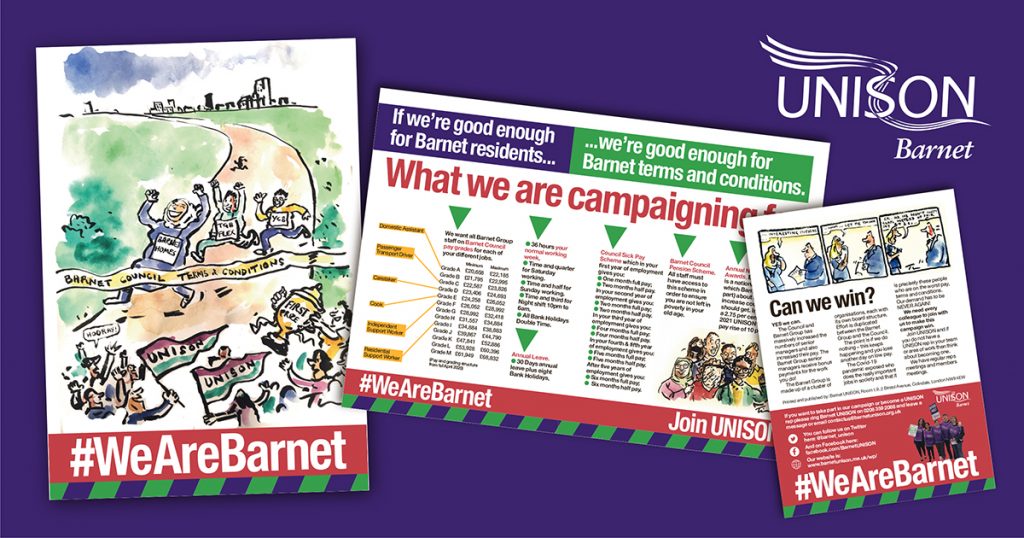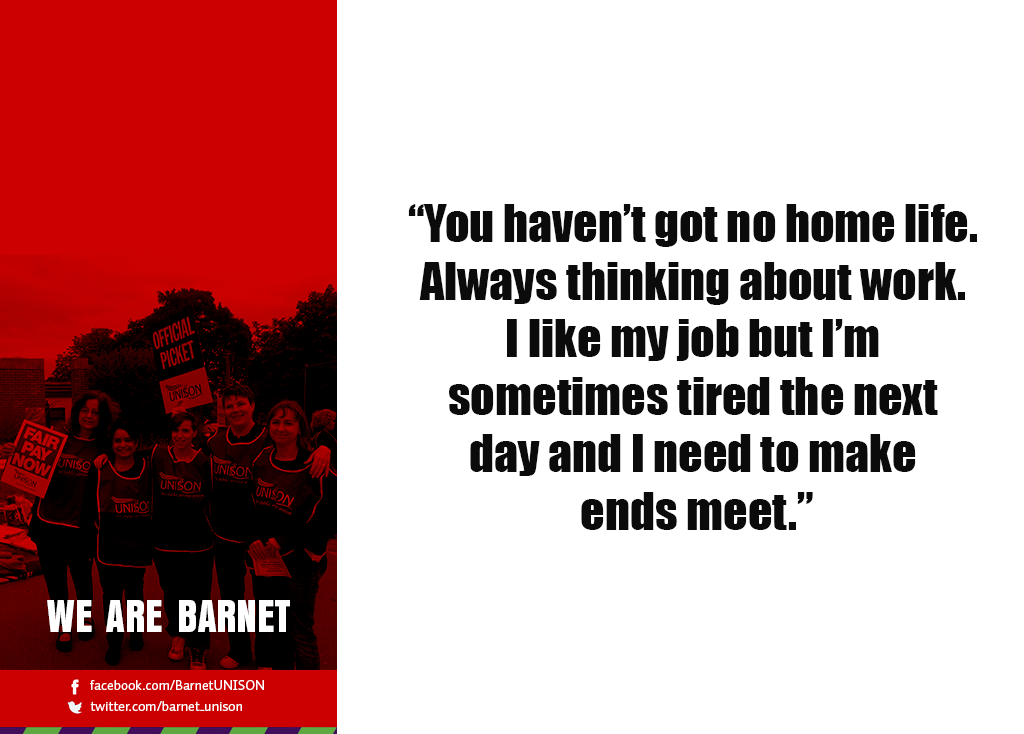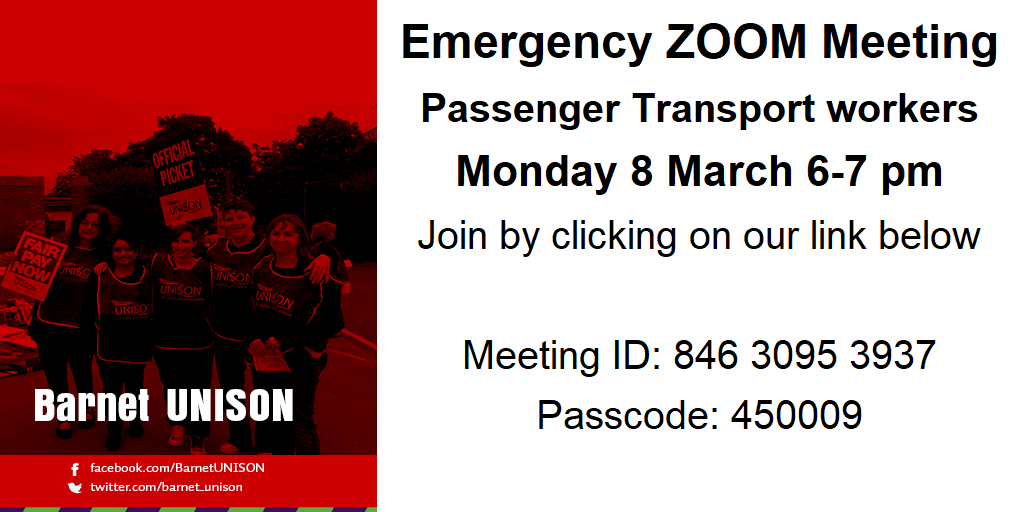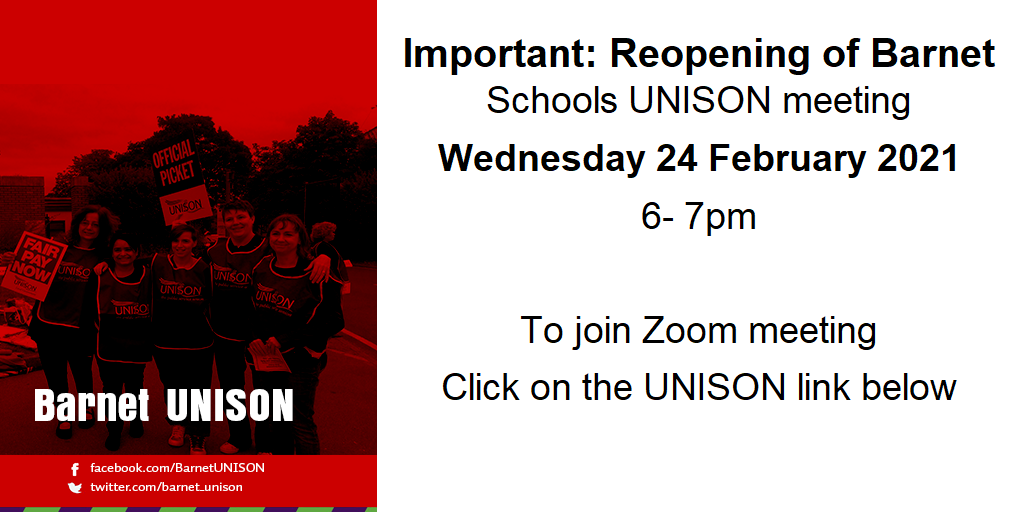We want Barnet Council Terms & Conditions.




“If we’re good enough for Barnet residents, we’re good enough for Barnet terms and conditions” – A Barnet Group Worker
“I have rarely discovered such a deeply embedded scale of inequalities and exploitation in a local authority arms length company. This a damning indictment on the London Borough of Barnet who have colluded with this model for nearly a decade.” Dexter Whitfield, Director, European Services Strategy Unit
“It might be the London Living Wage but it’s not the London Living standard, is it?” – A Barnet Group Worker on hearing they are to be moved from being paid the National minimum wage to the London Living Wage (£8.72/ hr to £10.85/ hr)
The Barnet Group workers are all on different terms and conditions often for the exact same job. This creates divisions and inequalities. Very few of the workers are on terms and conditions which resemble the Council terms and conditions and although the Council terms and conditions are hardly generous they are better in all areas than the terms and conditions most of the workers in The Barnet Group have. It means the Council can choose to pay inferior terms and conditions if it wants to.
Barnet Group staff worked through the COVID pandemic putting themselves and the lives of their families at risk. A number of them became ill with COVID as a result. They are care workers, support workers and housing workers.
The Barnet Group is a subsidiary wholly owned by Barnet Council. It now employs over 1,000 workers and is almost as big as the Council itself. All of the jobs and services done by The Barnet Group were all once carried out by the Council directly.
‘The embedded inequalities of Terms and Conditions and Pay across The Barnet Group cannot be tolerated any further.
Barnet Group staff have been providing frontline services to the Public all the way through the Pandemic with little or no reward or recognition for the vital work and services we provide to Barnet residents on behalf of the Council – all we are asking is to be treated with the same respect as our colleagues who work directly for the Council – it really isn’t too much to ask!’ Patrick Hunter, Barnet UNISON convenor for Barnet Homes
“The Barnet Group is ridiculously complicated for work colleagues to understand. Frankly they do not understand how they can be doing the same job but be paid differently and I think we only need to understand one thing – it’s wrong. The high death rate in the UK from COVID is largely due to the socio-economic inequalities in the UK. We have had nearly one continuous year of lockdown. We all suffer when people are not paid enough to live on and thrive. This is why our campaign is about reversing that race to the bottom in pay, terms and conditions.” Helen Davies, Barnet UNISON Branch Chair
End.
Note to Editors: Contact details: Helen Davies Barnet UNISON on or 020 8359 2088 or email: Helen.Davies@barnetunison.org.uk
Background:
“We Are Barnet” Campaign explained https://youtu.be/m7wB0hY45Rk
We Are Barnet” explainer flyer https://bit.ly/3r9TDed
“We Are Barnet – Pay like Barnet” petition http://chng.it/wCm6ZzWTXs


Dear Barnet UNISON member
I am pleased to invite you to the Barnet UNISON Annual General Meeting (AGM) on Thursday 4 March 4-6pm
The last 12 months have been the most traumatic for many of our members both in the workplace and in their homes.
Our branch has tried its best to support as many of our members as possible and will continue to do so.
I am proud to introduce our first speaker Hilda Palmer who last year was recognised as “Most Influential person in health & safety for 2020” https://www.shponline.co.uk/shp-most-influential/hilda-palmer-named-shps-most-influential-person-in-health-safety-for-2020/
Hilda work on health & safety is inspirational and she has helped out branch immensely during the COVID pandemic.
I am sure you will want to hear what Hilda has to say about safety in the Covid workplace.
Our second speaker is the legendary Ken Loach. Our branch has been working with Ken for nearly two decades we have screened several of his films and Ken has been a big supporter of our members facing mass outsourcing.
Ken is joining us to talk about the brutal inequality in the workplace that has caused untold damage to the life chances of so many.
He will introduce a clip from his most recent film “Sorry We Missed You” https://www.youtube.com/watch?v=ysjwg-MnZao and discuss what lessons we can learn and what actions we as a branch must take to tackle inequalities in the workplace.
Our last two speakers are our very own Barnet UNISON reps Debbie & Anju both of whom work for The Barnet Group and organisation owned by Barnet Council. I’m really excited about what they have to say.
Our AGM is a really important meeting it decides what we as a branch are going to do for the next 12 months which is why we want all of our members to join us.
Due to COVID our AGM has to be online.
We need you to register to attend the meeting.
All you need to do is click on the Barnet UNISON link below to confirm you are coming to the meeting.
On the day before the AGM you will receive an email with the link to join the meeting.
I look forward to seeing you at our AGM.
Best wishes
John Burgess
Branch Secretary
Barnet UNISON
 Dear Barnet UNISON members
Dear Barnet UNISON members
In light of the Governments’ decision to reopen schools our branch want to make sure that we can provide as much support for all of our members who are going into work.
Good Ventilation is key to making a workplace/classroom safe.
I hope this briefing will provide useful for our members to be able to use for your workplace Risk Assessments which need to be updated. We have provided some questions you may want to submit to your employer.
Please let us know if you need help.
Introduction.
The Government SAGE EMG group reviewed the need for mitigations to reduce transmission of the new Covid variants and recommended that previous ventilation measures should be increased by 1.5 to 1.7 times.
Mitigations to reduce transmission of the new variant SARS-CoV-2 virus, 22 December 2020 (publishing.service.gov.uk)
Relevant para: 12. Transmission via the air is primarily mitigated by effective ventilation vi. This is most important in workplace and public settings where people interact, and is also important in the home, especially if there are visitors from outside the household, or someone within it has COVID-19. Where provision of adequate ventilation is difficult, the use of air cleaning devices may be a suitable alternative vii . Higher viral load associated with people who have the new variant could have significant implications for transmission via the air, as previous modelling suggests that viral load is a major determinant of airborne transmission risks. As a precautionary measure it is recommended that ventilation rates stated in previous EMG papersvi are adjusted accordingly to account for the increased risk (potentially 1.5-1.7 times higher). Application of ventilation controls is currently very variable between different settings, and it is essential to ensure that all public and workplace spaces include ventilation as part of their COVID secure risk assessment, and adopt appropriate measures to ensure it is effective (high confidence).
HSE references technical guidance from the building services professional body, CIBSE.
An October 2020 CIBSE update recommends a minimum of 10 litres per second per person of outside air in offices/classrooms and repeats the importance of avoiding recirculating air.
CIBSE Version 4 CIBSE – Emerging from Lockdown https://www.cibse.org/coronavirus-covid-19/emerging-from-lockdown;
See Hazards Magazine Venting https://www.hazards.org/infections/venting.htm
1. What is the airflow level in the workplace/classroom when unoccupied and occupied?
2. What level of outdoor/fresh air per person per second does the ventilation system provide in each workspace/classroom? (Please note CIBSE recommends airflow of 10 litres per person per second of fresh/outdoor and the WHO recommends 6 Room Air changes per hour)
3. Is data provided from a proven competent expert?
4. What are you using to monitor safe airflow levels in each workplace/classroom? For example CO2 monitors can provide a rough proxy measurement of ventilation: 600 to 800 ppm carbon dioxide indicates a relatively well-ventilated room.
5. How regularly are you monitoring safe airflow levels in each workplace/classroom during the day before occupancy and during occupancy?
6. What is the plan of action if airflow levels are unsafe?
